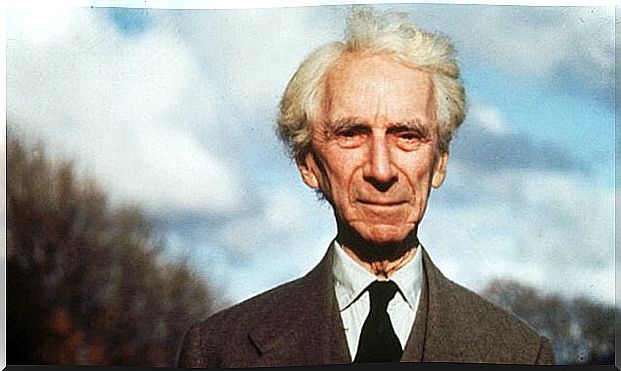This Is How Happiness Is Achieved, According To Bertrand Russell

Bertrand Russell was an English philosopher, mathematician, and writer who won the Nobel Prize for Literature in 1950. At first it would not seem that someone like him has any secret to happiness. In fact, much of his life was spent between disappointment and exhaustion. However, perhaps precisely because of this, he managed to turn his life around and learned to be happy.
This controversial thinker had the misfortune of losing his parents when he was just 6 years old. Since then he lived with his grandparents, who imposed a very strict education on him. From a very young age, he felt that life was almost unbearable and later he confessed that several times he had thought about committing suicide.
However, Bertrand Russell found in knowledge a way to wholeness. Philosophy and logic allowed him to deepen his own experience. He managed to give it a universal reach. And he also managed to elevate his spirit and overcome his suffering. These are some of the postulates to be happy, according to this philosopher.
Happiness is achieved by focusing on the outside
For Bertrand Russell, closing in on oneself, like a ball, only leads to sadness and boredom. If we focus on our problems, failures, voids , fears, etc., we will only lose enthusiasm for life. In this it coincides with Eastern philosophies and Lacanian psychoanalysis. These two currents state that the “I” is the source of suffering or disease.

On the other hand, if we pay attention to external aspects, life becomes simpler. Those external aspects comprise a multitude of realities. Knowledge, other people, one’s work, hobbies, etc. All this makes life more interesting and fulfilling.
Bertrand Russell points out that expansive attitudes bring exhilaration and joy. They are also in themselves a source of energy and motivation. Likewise, they provide elements to have more strength when solving their own problems.
The way to cultivate the expansive attitude
The expansive attitude does not come about spontaneously, but must be cultivated. For B. Russell, staying distracted in everyday activities is an attitude that opens the doors to happiness. Nor is it about turning your back on introspection or self-reflection, because this would lead to a banal life. Rather, it would be a matter of finding a particular balance and that it would have nothing to do with placing the fulcrum in a place equidistant from the extremes.

In this regard, it is also important to choose the right time and the right mode. There is a time to think about oneself and another to focus on the external. Think about your own problems only when it makes sense to do so; in the rest of the time we would have to turn our attention abroad.
What Bertrand Russell proposes is the cultivation of an orderly mind. If this is achieved, the mind will always be clearer and more oriented towards the present. When you think about yourself, it must be done with rationality and maximum concentration. We should also be able to question our own reasoning to determine its validity.
Two virtues to cultivate
Bertrand Russell’s own life demonstrates something that he later asserted: happiness is a conquest. It is not given by spontaneous generation, nor does it come from outside. The ability to be happy is precisely that: a capacity, which must be worked, cultivated and achieved. For this, it is essential to have two virtues: effort and resignation.

The effort is that willingness to direct the energies towards the work that allows to achieve something desired. It takes commitment and also perseverance. Nothing really valuable is achieved overnight. And be happy, much less. Therefore, it is important to cultivate that attribute that allows to gather and direct the efforts towards the achievement of the objectives.
Another of the essential virtues to achieve happiness, says Russell, is resignation. Perhaps it would be more accurate to speak of “acceptance”. Life poses situations that are unavoidable and impossible to resolve. We could take as an example death, incurable disease or permanent losses.
Although we cannot reverse them, what we can do is increase our capacity to accept them. Do not waste time trying to solve them or let them take away our peace by writing them in our history in a way that does us good.
Bertrand Russell was one of the most brilliant men of his time. His thought continues to be in full force. He stopped being an orphan and sad child who felt lost in the world, to become one of the most important intellectuals on the planet. The best sustenance for his words was his own life and his own achievements.









